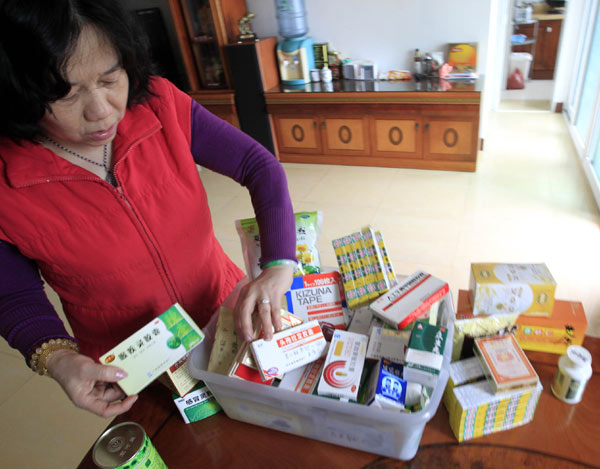Drug misuse prevalent in public
About 70 percent of Chinese families improperly use medicine, according to a survey conducted by China Nonprescription Medicines Association.
|
A woman checks her family's reserve stock of medicines in her house in Guangzhou, capital of Guangdong province, on Sunday. |
The survey, which polled 10,000 people and was released on Sunday, concluded that a majority of the populace tends to go to drugstores to buy medications for minor sicknesses instead of seeing a doctor. It also said that more than half of the respondents had no understanding of why over-the-counter medicines should be their first choice at pharmacies, and that more than 40 percent of them mistook pain-relief drugs for over-the-counter medicines.
Worse, about half of those polled did not know the meaning of "over-the-counter", according to the survey.
"The lack of knowledge about drugs among the public may lead to serious consequences," Bai Huiliang, the president of the China Nonprescription Medicines Association, told China News Service.
The reasons for concern are particularly pressing on the mainland, where, because of loose supervision, the public can often buy prescription drugs at drugstores without doctors' prescriptions.
In recent days, media reports on adverse reactions to Nimesulide, a prescription-only medicine taken to treat severe pain, have again roused public concern over drug safety and the proper use of drugs.
The drug, widely prescribed in China to reduce fevers, is still available despite a concern over its effects on children. Experts, speaking at the International Forum on Children's Drug Safety held in Beijing in November, warned that those could include death.
Since being introduced into the mainland market six years ago, the drug has been tied to thousands of ill side effects like rashes and minor liver damage.
Nimesulide is banned in many parts of Europe because of the harm it is known to cause to the liver in rare but unpredictable cases. In the United States, the drug didn't win the US Food and Drug Administration's approval for use in children.
In response to the concerns about the drug, the State Food and Drug Administration of China said it will strengthen its monitoring for adverse reactions among users and organize expert reviews of the drug.
It also warned drugstores to not sell prescription drugs unless customers can furnish prescriptions.
Sun Zhongshi, an expert with the national medication monitoring system under the Ministry of Health, told the China News Service that customers should be taught about the property way to use drugs so they can avoid doing harm to themselves. He also encouraged the public to follow doctors' advice rather than buy medications on their own.
 0
0 








Go to Forum >>0 Comments